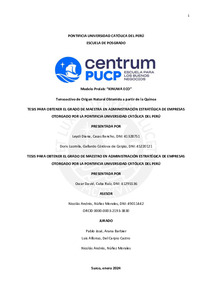| dc.contributor.advisor | Núñez Morales, Nicolás Andrés | |
| dc.contributor.author | Casas Bancho, Leydi Diana | |
| dc.contributor.author | Gallardo Córdova de Carpio, Doris Luzmila | |
| dc.contributor.author | Cuba Ruíz, Oscar David | |
| dc.date.accessioned | 2024-04-04T20:56:36Z | |
| dc.date.available | 2024-04-04T20:56:36Z | |
| dc.date.created | 2024 | |
| dc.date.issued | 2024-04-04 | |
| dc.identifier.uri | http://hdl.handle.net/20.500.12404/27522 | |
| dc.description.abstract | Durante muchos años, las diferentes industrias relacionadas con insumos químicos han
generado desechos que contaminan el medio acuático y afectan negativamente el ecosistema.
Actualmente, la industria de cuidado personal y de higiene del hogar tiene un gran desafío que
afrontar debido a que los consumidores son cada vez más exigentes, buscan productos altamente
efectivos, seguros para el uso y que no afectan el medio ambiente. Como respuesta, esta industria
se viene transformando para alinearse a las nuevas necesidades del consumidor y del planeta.
Las nuevas tendencias impulsan a las marcas a buscar una diferenciación creciente. Por
ello, los equipos de Innovación y Desarrollo en las empresas cosméticas y de productos para el
cuidado del hogar están en una búsqueda constante de materias primas y empaques que no
contaminen el medio acuático. Su objetivo es crear productos respetuosos con el medio
ambiente.
Ante la necesidad de materias primas biodegradables para el cuidado del medio acuático,
surge Kinuwa Eco. Este modelo de negocio se presenta como un tensoactivo de origen natural,
biodegradable derivado de la quínoa que puede ser utilizado por la industria de cuidado personal
y del hogar como ecosurfactante, reemplazando los tensoactivos tradicionales los cuales tienen
un alto impacto en la contaminación de ecosistemas acuáticos. La presente solución de negocio
contiene en su apartado de viabilidad económica la cifra de la inversión inicial, que asciende a $
85,029 y se financiará en un 40% con la provisión de los accionistas y 60% por financiamiento
bancario. El costo de los fondos autónomos (COK) equivale a 24.86% y se aplicó el modelo
“Capital Asset Pricing Model” - CAPM, y para el cálculo del WACC, el COK con la
devaluación anual, se obtuvo un valor de 15.02%. Además, se obtuvo el valor actual de los
beneficios y costos sociales totales, lo que dio como resultado un VAN de tipo social de
$440,355.8. | es_ES |
| dc.description.abstract | For many years, the different industries related to chemical supplies have generated
wastes that pollute the aquatic environment and negatively affect the ecosystem. Today, the
personal care and household hygiene industry has a great challenge to face as consumers are
increasingly demanding, looking for products that are highly effective, safe to use and
environmentally friendly. In response, the industry is transforming itself to align with the new
needs of consumers and the planet.
New trends are driving brands to seek increasing differentiation. As a result, innovation
and development teams in cosmetics and home care companies are constantly searching for raw
materials and packaging that do not pollute the aquatic environment. Their goal is to create
environmentally friendly products.
In response to the need for biodegradable raw materials for the care of the aquatic
environment, Kinuwa Eco was created. This business model is presented as a natural,
biodegradable surfactant derived from quinoa that can be used by the personal and home care
industry as an eco-surfactant, replacing traditional surfactants which have a high impact on the
contamination of aquatic ecosystems. The present business solution contains in its economic
feasibility section the figure of the initial investment, which amounts to $85,029 and will be
financed 40% with the provision of shareholders and 60% by bank financing. The cost of
autonomous funds (COK) is equivalent to 24.86% and the "Capital Asset Pricing Model" -
CAPM was applied, and for the calculation of the WACC, the COK with the annual devaluation
and a value of 15.02% was obtained. In addition, the present value of the total social benefits and
costs was obtained, resulting in a social NPV of $440,355.8. | es_ES |
| dc.language.iso | spa | es_ES |
| dc.publisher | Pontificia Universidad Católica del Perú | es_ES |
| dc.rights | info:eu-repo/semantics/openAccess | es_ES |
| dc.rights.uri | http://creativecommons.org/licenses/by-nc-nd/2.5/pe/ | * |
| dc.subject | Desarrollo sostenible--Empresas--Perú | es_ES |
| dc.subject | Quinua--Procesamiento | es_ES |
| dc.title | Modelo prolab: “Kinuwa Eco” tensoactivo de origen natural obtenido a partir de la quínoa | es_ES |
| dc.type | info:eu-repo/semantics/masterThesis | es_ES |
| thesis.degree.name | Maestro en Administración Estratégica de Empresas | es_ES |
| thesis.degree.level | Maestría | es_ES |
| thesis.degree.grantor | Pontificia Universidad Católica del Perú. CENTRUM | es_ES |
| thesis.degree.discipline | Administración Estratégica de Empresas | es_ES |
| renati.advisor.dni | 49011442 | |
| renati.advisor.orcid | https://orcid.org/0000-0003-2193-3830 | es_ES |
| renati.author.dni | 41328751 | |
| renati.author.dni | 45220121 | |
| renati.author.dni | 41295536 | |
| renati.discipline | 413307 | es_ES |
| renati.juror | Arana Barbier, Pablo José | es_ES |
| renati.juror | Del Carpio Castro, Luis Alfonso | es_ES |
| renati.juror | Núñez Morales, Nicolás Andrés | es_ES |
| renati.level | https://purl.org/pe-repo/renati/level#maestro | es_ES |
| renati.type | https://purl.org/pe-repo/renati/type#tesis | es_ES |
| dc.publisher.country | PE | es_ES |
| dc.subject.ocde | https://purl.org/pe-repo/ocde/ford#5.02.04 | es_ES |







